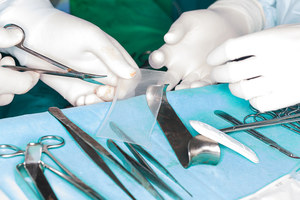 (Not all surgical mesh has been banned. The FDA ruling pertains only to transvaginal mesh for prolapse, not mesh placed abdominally for prolapse or slings for urinary stress incontinence. And transvaginal mesh is not the only option for pelvic organ prolapse (POP). It can also be treated with conservative management, pelvic floor physical therapy and other therapies.)
(Not all surgical mesh has been banned. The FDA ruling pertains only to transvaginal mesh for prolapse, not mesh placed abdominally for prolapse or slings for urinary stress incontinence. And transvaginal mesh is not the only option for pelvic organ prolapse (POP). It can also be treated with conservative management, pelvic floor physical therapy and other therapies.)FDA Transvaginal Mesh – more than 10 years of warnings
In the FDA order (April 16, 2019), the two remaining transvaginal mesh manufacturers, Boston Scientific and Coloplast, did not show that their devices were “safe and effective long term”, which begs the question: How long is the FDA’s definition of “long term”?
Back in 1996, the very first pelvic mesh comprised a strip used as a sling to help support the bladder and treat stress urinary continence. From 2002 through 2013, over 100 transvaginal meshes were cleared (by the 510K pathway) for pelvic organ prolapses, or POP, even as adverse event reports were flooding in. Rather than take the product off the market, the FDA issued warnings, beginning in 2008, of mesh erosion, infection, pain and more.
By 2009 transvaginal mesh lawsuits were being filed. LawyersandSettlements reported complaints filed against Mentor Inc. for its ObTape vaginal sling. By 2011 health professionals were calling on the FDA to remove all surgical mesh products from the market. In an interview with LawyersandSettlements, medical consultant Lana Keeton said "Synthetic Surgical Mesh is a life-threatening device…It is toxic, over-engineered and degrades during manufacture, shelf life and in the human body following surgical implantation."
Keeton said that, “without a doubt”, the transvaginal mesh sling or TVT is inherently defective and the manufacturers basically sold doctors on a product that was never tested.
Recent Transvaginal Mesh Complaints
Jackie from Seattle says in an email that she was implanted with TVM for urinary incontinence. “It worked for about a year, then SUI returned with a vengeance, worse than before the TVM. I have lower abdominal pain when going to the bathroom. It is always diagnosed as a bladder infection or a yeast infection. Every time I am given antibiotics but never really goes away. It just didn't work the way it should have and now I have to live with it.”
Sally from Phoenix says she had TVM for bladder prolapse surgery. “About 10 years later I needed surgery again because of the mesh and now I am feeling pain again. I am sure I am having the same problem. After reading about women having complications I am worried about more complications in my future…when is the FDA ever going to ban this mesh permanently? They are treating women like guinea pigs.”
Current TVM Lawsuits and Settlements
READ MORE SURGICAL MESH LEGAL NEWS
Johnson & Johnson also agreed last month to pay $9.9 million to avoid going to trial for failing to disclose risks in the instructions and marketing materials for surgical mesh devices, including those for incontinence.
